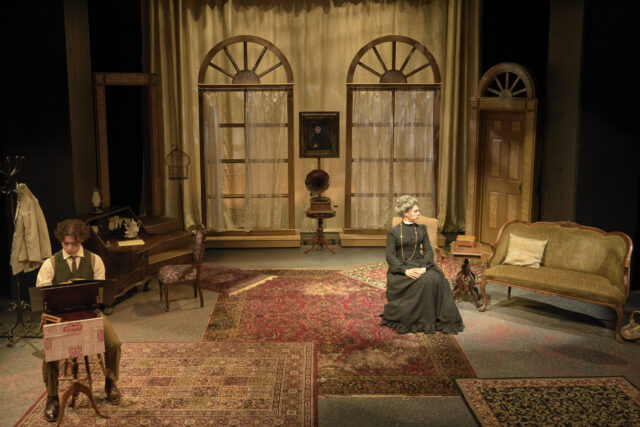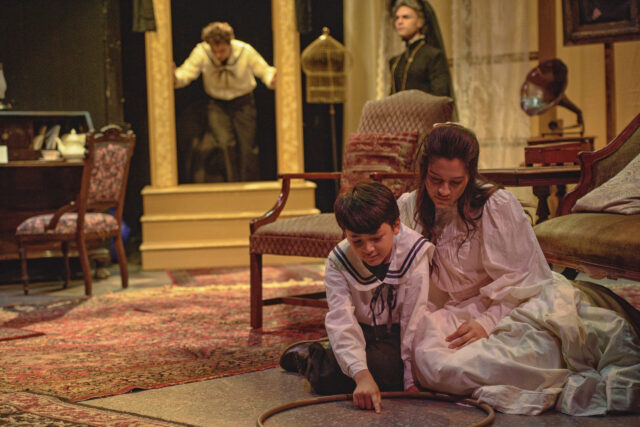
Dogteam Theatre Project is presenting La Viuda in repertory with A Hundred Circling Camps (photo by Clinton Brandhagen)
LA VIUDA
Dogteam Theatre Project
Atlantic Stage 2
330 West Sixteenth St. between Eighth & Ninth Aves.
Tuesday – Sunday through August 4, $23.18-$33.85
www.dogteam.org
For many recent summers, I looked forward to the Potomac Theatre Project’s (PTP/NYC) annual residency at Atlantic Stage 2, where it presented works by such playwrights as Tom Stoppard, Caryl Churchill, Howard Barker, Robert Chesley, Vaclav Havel, and Steven Berkoff. Founded in 1987 by co-artistic directors Cheryl Faraone, Richard Romagnoli, and Jim Petosa at Middlebury College, PTP/NYC has now morphed into the Dogteam Theatre Project (DTP), under the leadership of cofounders Olga Sanchez Saltveit, Courtney Smith, and PTP/NYC veterans Alex Draper and Mark Evancho.
Its inaugural season is under way at Atlantic Stage 2, with Sam Collier’s A Hundred Circling Camps, about a 1932 protest by veterans over a promised bonus, running in repertory with the English-language US debut of María Irene Fornés’s 1961 epistolary play, La Viuda (“The Widow”). Havana-born Fornés’s first work, La Viuda was adapted from letters that a cousin of hers wrote from Seville, Spain, to her great-grandfather in Cuba. (Fornés’s final play, 2000’s Letters from Cuba, was also based on family correspondence.)
La Viuda takes place from 1899 to 1902, after the Spanish-American War in which Cuba sought its independence from Spain, as Angela Martin (Jay Romero) dictates a series of letters to a clerk (Zeph Santiago) in her Spanish home. Although there is a lovely writing desk in the room, the clerk sits on an uncomfortable stool at a music stand as Angela essentially narrates her life story upon learning that her long-estranged husband, Francisco de Arenal (Jesse Muñoz), known as Paco, has had a serious stroke and “has lost all rational capacity.” She is particularly concerned that she might be erased from Paco’s official documents in favor of his supposed wife in Cuba, even though he and Angela, who lived in separate countries for decades, never divorced.
“I believe it is the illness of a remorseful conscience for having lived like a libertine in free love with that . . . thing,” she says to her cousin David. “My marriage has never been dissolved. However, my loyal friend, Casimiro Paz, has sent me a newspaper clipping that says: ‘Seen among the attendees was the illustrious writer Francisco de Arenal and his distinguished wife, Mrs. . . . F . . . F . . . David, the name written in that space is not mine!’”
Soon scenes from her past play out as she discusses them in the letters. She explains to Father Cravet (Fidel Vicioso) how Paco, a journalist, made enemies of such men as Don Modesto (Vicioso) and Angela’s father. Paco and Angela have a son, Salvador (Jacob Joseph Medina at five, Zack Maluccio at twenty-one), who believes he is “meant to save,” but that doesn’t prevent Paco from leaving them and beginning a second life in Cuba and then New York (following the Ten Years’ War between Cuba and Spain). Angela’s friend Moncita (Bri Beach), shares unsubstantiated gossip about Paco’s time in New York and his desperate attempts to gain respect, but he appears to have been a ne’er-do-well cad. In the middle of a hilarious monologue, Moncita explains, “Well, it’s none of my business and I don’t meddle in other people’s affairs,” before continuing with more news about other people’s affairs.
No longer a mother or a wife, Angela seeks to reestablish her dignity and identity, but it seems that the world has already passed judgment on her.

Scenes from Angela’s (Jay Romero, back right) past play out before her eyes (photo by Clinton Brandhagen)
Directed and translated by Saltveit, La Viuda is a bumpy ride, feeling long even at a mere seventy-five minutes, but it has many poignant moments. Furthering the idea of Angela searching for her identity, she is sternly portrayed by a man, Romero, in a black dress, as if mourning a life lost. Romero acts out punctuation while flitting around Evancho’s set, which also features a couch, an end table, a period chair, doors at the back right and left, curtained windows, a Hans Memling–like portrait of the young Salvador, an empty birdcage, and an old gramophone. Angela is not the most generous of people; not only will she not allow the clerk to sit at her desk, she is extremely careful when considering offering him a piece of candy.
The cast includes several Middlebury students and recent grads as well as nine-year-old Medina, who studies acting at the Triple Promise Academy for the Performing Arts in Bay Ridge. Santiago, class of 2026, has the most unusual perspective; he is onstage the entire time, taking Angela’s dictation while barely speaking as the action plays out behind him. Every so often he shakes a ratchet noisemaker, which gets annoying quickly.
Summer Lee Jack’s costumes range from persnickety to playful; both the younger and older Salvadors wear the same sailor outfit, and near the end several characters are identified by hand-drawn boards around their neck. One of the best bits involves widow’s wigs arriving in a most unexpected way.
Nine-time Obie winner Fornés, who died in 2018 at the age of eighty-eight, went on to become a well-known experimental playwright, with such credits as Tango Palace, Mud, Fefu and Her Friends, Drowning, and Evelyn Brown (A Diary). She wrote La Viuda while in a relationship with Susan Sontag, who was suffering from writer’s block at the time. At an early rehearsal of a scene from La Viuda at the Actors Studio, where Fornés was a member, she jumped up and tried to direct one of the actors but was told by the actual director that she should not do that; the experience led her to direct the inaugural production of more than fifty of her works.
Fornés, an important influence on such playwrights as Nilo Cruz, Paula Vogel, Lanford Wilson, Sam Shepard, Edward Albee, Tony Kushner, Eduardo Machado, and others, deserves to be more well known; DTP has done us all a noteworthy service by presenting this first-ever English version of the show that started it all.
[Mark Rifkin is a Brooklyn-born, Manhattan-based writer and editor; you can follow him on Substack here.]